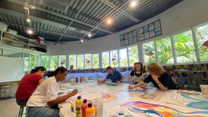In the most recent Cayman Islands Student Drug Use Survey (CISDUS) conducted by the National Drug Council (NDC), it was found that 29.3% of students reported that they have been curious to try drugs. And, alarmingly, the age of first use for all substances, except inhalants/solvents, ranged from 11.3 to 13.5 years. Finding a way to talk about this issue with your child can be a struggle.
Adolescence is a period of great psychological, biological and social development. Teens are expanding their intellectual and emotional capabilities, growing physically and maturing sexually, attempting to construct themselves as individuals and develop a sense of who they are and, most importantly, how other people perceive them. And these changes are fundamental to the adult they will eventually become.
On top of this, there are external pressures firing from every angle, whether that be peer pressures, educational pressures, or relationships. Essentially, it’s a very overwhelming and complex period to navigate using the tools currently at their disposal.
In her extensive research, Sarah-Jayne Blakemore, author and professor of Psychology and Cognitive Neuroscience at the University of Cambridge, discusses the risk-taking behaviour often seen in adolescents. The teenage brain is often referred to as being ‘hard-wired’ for breaking rules, defying elders, prone to being self-conscious and having poor impulse control.
Recommended Reads
Inventing Ourselves: The Secret Life of the Teenage Brain, by Sarah-Jayne Blakemore
Empirical research across the world demonstrates that adolescents are more prone to taking risks than both children and adults. If you were to plot risk-taking behaviour by age on a graph (which many studies have done), you’d invariably see an inverted U shape peaking around the late teens.
The Science Behind It
Blakemore delves into the neuroscience behind this typical teenage behaviour. She explains how the limbic system, an area deep inside the brain, is involved in emotion processing and reward processing (both responsible for producing the ‘kick’ out of taking risks).
During adolescence, these areas are hypersensitive to the reward feeling when compared to adults. At the same time, the prefrontal cortex at the front of the brain, which prevents us taking risks, is still very much in development at this stage. Hence, risk-taking becomes more likely than self-regulation.
A key factor in risk-taking is also social influence. When in a social situation, teens are more susceptible to taking risks. This is largely due to adolescents being hypersensitive to being socially excluded. Despite an intelligent student knowing all the dangers and health risks associated with smoking tobacco, drinking alcohol or taking drugs, when offered a substance from their peer, the answer may still be yes. Emanating from the fear the student may be ostracised from their peer group, the student may take the substance. This is because the acceptance from their friends will produce a reward feeling which outweighs the potential risks and becomes enough reason for saying 'yes'. The prefrontal cortex doesn't stand a chance!
Resources
If you're concerned about your teen's substance use, want to learn more on the subject or obtain referrals to programmes in the community, contact one of the following organisations:
Al Anon Web: www.caymanaa.org.
National Drug Council The 'Parents as Preventers' programme is designed to educate parents and caregivers on some of the early warning signs of substance use. It also provides information and skills to help parents take a positive approach when dealing with teens and developing effective drug prevention. Tel: (345) 949 9000, email: info@ndc.ky or visit web: www.ndc.ky.
Department of Counselling Services An agency within Government that provides cost-effective treatment services. Tel: (345) 949 8789, email: foi.dcs@gov.ky, web: www.dcs.gov.ky.
The Wellness Centre Provides psychology, mental health and behavioural services. Tel: (345) 949 9355, email: info@wellnesscentre.ky.
What are the Risks?
Risks can be characterised as any action or behaviour that produces an uncertain outcome, and they can take many different forms. For adolescents, they may include skipping school, getting a lift with someone who has been drinking, shoplifting, vandalism and having unprotected sex. Another very common risk is experimenting with alcohol and other drugs.
Substance Use in Cayman
In Cayman, the recent student drug use survey (CISDUS) reported that alcohol has the highest prevalence for early onset of use among students, with a reported 27.8% of students indicating first use at the age of 13 years or younger (2024). In addition, 29.3% of students reported that they have been curious to try drugs. Both of these stats give rise to the need for better education for parents on how to talk to their children about taking risks, particularly in relation to substance use.
Parental Guidance on Youth Substance Use
Prevention Specialist, Simon Miller, leads the NDC’s ‘aParently Speaking’ workshop, designed for parents to be able to identify the warning signs of youth substance use and help them to implement best practice prevention efforts to prevent harm before it occurs. Speaking to Cayman Parent, Simon advised on the best parental guidance on youth risk-taking and substance use:
Stay Informed Together Initiate an open dialogue with your teen about vaping, drinking and drug use, emphasising the importance of understanding the risks and uncertainties associated with it. Keep the conversation ongoing and interactive rather than lecturing.
Observe Behavioural Changes Keep an eye out for changes in your teen's behaviour, such as irritability, mood swings or declines in academic or athletic performance. These could be indicators of vaping or substance use.
Related Articles
Pay Attention to Physical Signs Look for physical signs like nosebleeds, increased thirst, coughing or mouth sores, bloodshot eyes, changes to appetite or sleep patterns, slurred speech or impaired coordination. All these signs may be linked to vaping, drinking or drug use.
Start Conversations Strategically It's often helpful to use everyday opportunities, like seeing someone using substances on TV, as a springboard to initiate conversations about substance use with your teen. This approach can make discussions feel less confrontational and more natural.
Seek Professional Help If your teen is struggling to quit using substances, seek support from healthcare professionals or counselling centres specialising in addiction or smoking cessation classes.
By staying informed, maintaining open communication and seeking support when needed, parents can play a crucial role in preventing and addressing youth substance use. The NDC encourages parents to reach out and stay updated by participating in their 'aParently Speaking' workshops.









